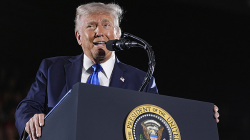Expert Says Trump's Tariffs Will Primarily Harm U.S. Consumers
The article examines the potential negative impacts of Trump's tariffs on the U.S. economy. It delves into how these trade policies could disrupt market dynamics, affect consumers, and lead to broader economic challenges. Key insights and opinions emphasize the implications of these tariffs on various sectors within the country.

According to the news agency, over 98 percent of clothing in the U.S. is imported.
Research from the Yale University Budget Lab indicates that short-term price increases of 65 percent for clothing and 87 percent for leather goods could occur, as U.S. tariffs "disproportionately affect" these items.
The U.S. Chamber of Commerce expressed concerns in a letter to the White House about the potential for "irreparable harm" to small businesses and the risk of an economic recession, urging for immediate tariff relief.
In a statement released Thursday, the chamber noted that it had sent correspondence to Treasury Secretary Scott Bessent, Commerce Secretary Howard Lutnick, and Trade Representative Jamieson Greer the previous day.
"The Chamber requests the administration take immediate action to save America's small businesses and stave off a recession," the letter stated.
Additionally, a proposed 25 percent U.S. tariff on pharmaceutical imports could drive up U.S. drug costs by nearly $51 billion annually, leading to price increases that could reach as much as 12.9 percent if passed on, according to a report commissioned by the industry’s U.S. trade group and reviewed by Reuters.
An analysis by Ernst and Young found that in 2023, the U.S. imported $203 billion worth of pharmaceutical products, with 73 percent coming from Europe, particularly from Ireland, Germany, and Switzerland. The total sales of finished pharmaceuticals in the U.S. that year amounted to $393 billion.
Many Americans are preparing for higher prices on a wide array of consumer goods as a result of U.S. tariffs. A recent Reuters/Ipsos poll revealed that approximately 57 percent of respondents, including a quarter of those from Trump's Republican Party, opposed Trump's new tariffs.
Sophie Wagner for TROIB News
Find more stories on Business, Economy and Finance in TROIB business












